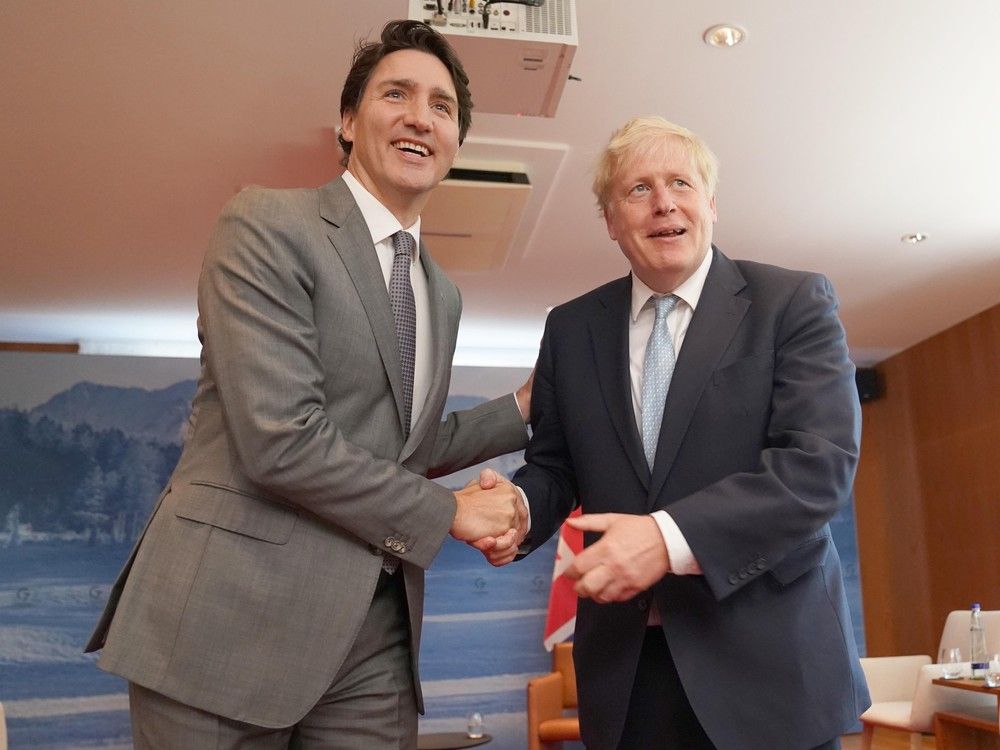
What about mobilizing the Commonwealth as an innovative trade tool capable of reducing on the U.S.? The paperwork is already done! Back in a post-COVID funk two world leaders — Canadian Prime Minister Justin Trudeau and then-United Kingdom top dog Boris Johnson — were yukking it up over a new trade deal several years ago.
Our two countries just signed something called the Canada-U.K. Trade Continuity Agreement.

The two guys signing documents seemed jubilant, even jolly. The two world leaders were genuinely happy about such an exuberant show on a deal which advocates co-operation over protectionism, like we’re seeing now with an . Now, don’t assume this high-minded talk of trade and protectionism suggests I understand any of these issues or the broader platform of economics public policy.
I don’t have a clue. I’ve long thought, however, as protectionist winds increase, maybe there’s a new way to go. I’ve also long thought, as a supporter of the Commonwealth, what about increasing trade among the 53 countries of the voluntary organization? An article by Jack Hughes in Policy Options from January 2019, entitled “The untapped potential of Commonwealth Markets,” tells me the 2.
4 billion people in these 53 countries have a combined gross domestic product of roughly $13 trillion US, or roughly the GDP of China. It would appear arguments that the Commonwealth is too small on which to pioneer new types and approaches to trade policy aren’t a deal breaker. Looking to Commonwealth countries as may be a good idea for a characteristic that has nothing to do with trade.
And everything to do with trade. The Commonwealth is often described as a people-to-people organization. Where other international forums are government-to-government or country-to-country — highly political and formal — the Commonwealth is built far more on people, and the warm relationships that result in bringing people together.
That has nothing, in a formal sense, to do with trade. However, as already noted, it has everything to do with building new trade ties because human and less formal personal relationships often coalesce into the foundation of trust. I saw and experienced that trust as a young newspaper reporter.
In 1986, I spent a term as a Commonwealth Press Fellow at City University in London, in a Commonwealth-funded program, with more than a dozen journalists from around the Commonwealth. My colleagues and I often wondered why the content of our program was so general. That was because our teachers were exposing us to the Commonwealth as a human, people-to-people organization.
What good is that, I can hear the critics saying? You all go back to your home country and life goes on. Life goes on until a later life when, while I was a consultant at a communications company, the president of one of our largest corporate clients wanted to expand into New Zealand. He inquired who he might talk to to gain a better understanding of the island nation.
A few days later he was talking to the prime minister in a meeting courtesy one of my colleagues in that long ago City University course. Similar patterns emerged many times over the years, where our happy little band of Commonwealth journalists had a contact in one Commonwealth country and were able to connect people who needed to be connected in another corner of the Commonwealth. That, in a people-to-people organization, is how you build trust.
And just because the tool has never explicitly expanded to trade relationships, doesn’t mean it can’t now. There is often a basic trust in Commonwealth countries which ordinary folks are prepared to mobilize in connecting the people of the Commonwealth. Might the Commonwealth’s time have come? Might a couple of prime ministers, unencumbered by traditional trade policy, be just the two guys to yuk it up and make Commonwealth trade ties happen as a force of the future?.















